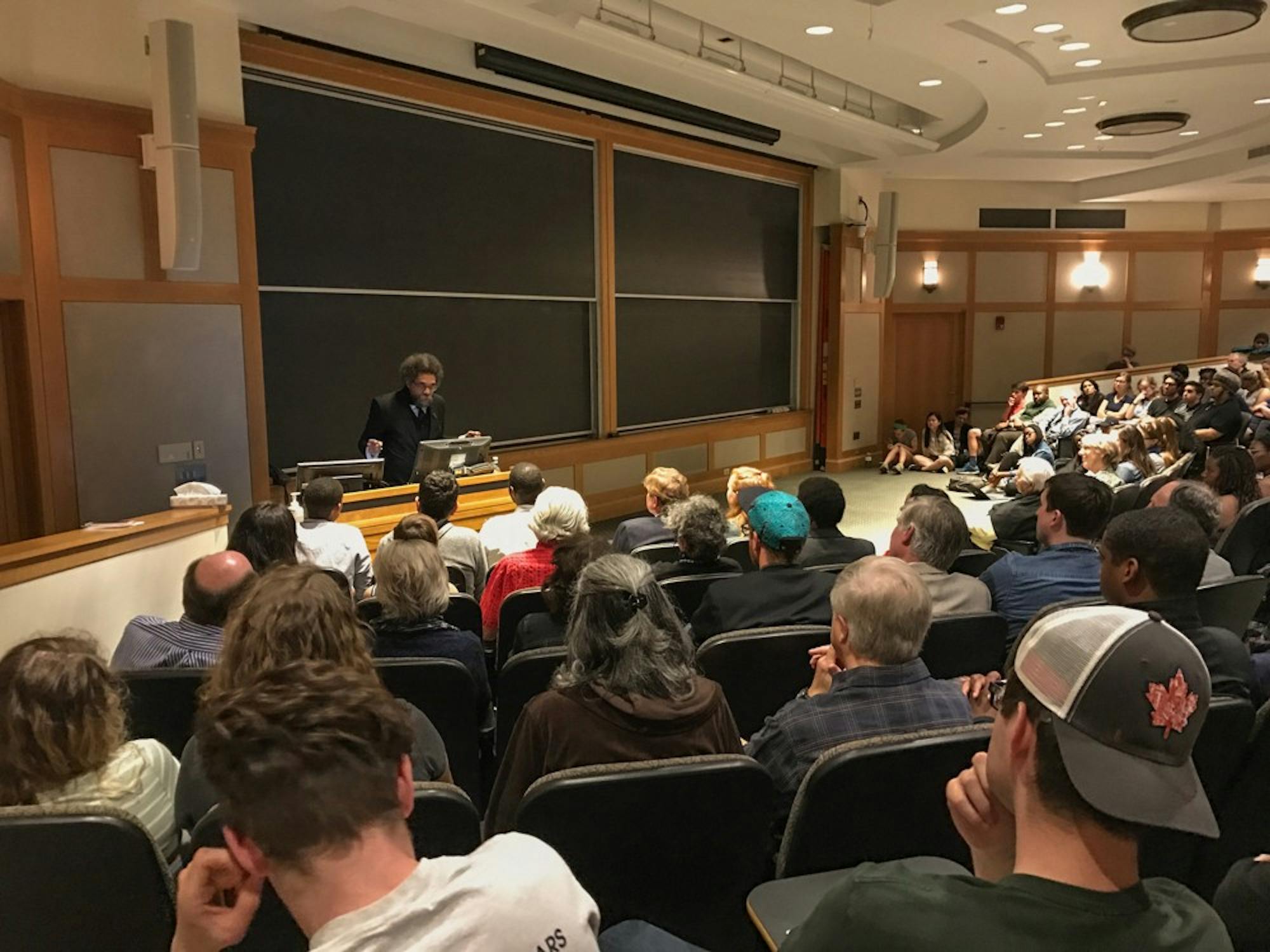On Thursday, Cornel West, a prominent social critic and public intellectual, delivered a lecture called “Intellectual Vocation and Political Struggle in the Trump Moment” to a standing room-only audience in Filene Auditorium. Over 250 students, faculty and community members attended the hour-long speech, which required two overflow rooms in Moore and Kemeny Halls to accommodate the number of viewers. Before the speech, West met with individual students at a meet-and-greet event hosted by the Leslie Center for the Humanities.
During the speech, West drew extensively from philosophy, literature and history to discuss timely political issues, including President Donald Trump’s administration. On multiple occasions, West referred to Trump as a “gangster” but insisted that Trump’s rise to the presidency is no historical phenomenon.
“America has a long tradition of white mediocrity in high places,” West said. “Trump makes [even that claim] look bad.”
West offered strong words about the 2016 presidential election, describing the race between former Democratic presidential candidate Hillary Clinton and Trump as a choice between a “neo-liberal disaster” and a “neo-fascist catastrophe.” He also criticized former President Barack Obama, denouncing his frequent use of drone strikes and his alleged close ties to Wall Street.
One politician who escaped West’s critique of the political establishment was Sen. Bernie Sanders, D-Vt., whom West supported in his campaign against Clinton for the 2016 Democratic presidential nomination. West extensively praised both Sanders’ political positions and character.
“One thing you can’t deny — lined up against the other candidates — was [Sanders’] integrity,” West said.
West was introduced by associate dean of arts and humanities Barbara Will and religion department chair Randall Balmer, who described West’s intellectual credentials and work as a public intellectual.
Anticipating West’s ability to make sense of current political events, Balmer said he was confident West would “point [people] to the light.”
West structured his speech around four questions posed by activist and author W.E.B. Du Bois in his 1957 novel “The Ordeal of Mansart.” West noted that he plans to use those questions, which Du Bois admitted are challenging to answer and often contradictory, in his own epitaph.
West discussed Du Bois’ first question, “How shall integrity face oppression?” by focusing on the concept of spiritual integrity, which he framed as “an investment in self-investment.” He also noted that the integrity must be grounded in love in order to persist challenges.
West noted that Americans are “well-adjusted to injustice and well-adapted to indifference.”
While examining integrity, West frequently alluded to different politicians, including Obama, Clinton, Sanders and Trump.
He also noted that politicians from earlier generations practiced more integrity than modern politicians, citing noted conservative thinker William F. Buckley Jr. as an example.
“He had integrity. He was just wrong most of the time,” West said.
West continued the discussion of integrity by praising the actions of the Dartmouth Action Collective, a campus activist group. He also mentioned the power of black musical artists, whom he called “love warriors in song,” to overcome oppression, citing noted African-American artists such as The Temptations and James Brown.
He specifically discussed oppression in the form of occupation, drawing parallels between what he described as occupations of Tibet by China, Palestine by Israel and Iraq by the United States.
“Occupation lacks moral and spiritual integrity; it’s wrong, it’s unjust, it’s illegal,” West said. “And if we don’t come to terms with it, you’re going to reap what you sow.”
West then discussed the second question by Du Bois, “What does honesty do in the face of deception?”
West used examples like the prevalence of fake news as well as the overuse of the word “obviously” by younger generations to illustrate what he thought was the rise of deception in American political discourse.
Concluding the discussion on Du Bois’ second question, West noted, “Let the phones be smart — we’ve got to be wise and compassionate and self-critical.”
Du Bois’ third question was, “How shall decency and democracy respond to assault and attack?”
West said there is a clear difference between justice and revenge. If the American people gave into revenge, he argued, “there would have been a civil war in America every generation,” and figures like Martin Luther King Jr., Ida B. Wells and A. Philip Randolph would not exist.
The final question discussed was, “What does virtue do in the face of brute force?”
West claimed that righteous indignation, which is often mistaken for anger, is necessary when responding to the injustices caused by brutal force. He referenced the denial of tenure to Dartmouth history professor Derrick White and English professor Aimee Bahng, both faculty of color, as an example of brute force causing injustice.
“Some of us will go down swinging, like Ella Fitzgerald and Muhammad Ali, full of that commitment Du Bois was talking about,” he noted as he concluded the lecture.
Members of the audience often applauded in response to West’s social critiques and political statements. The lecture was followed by an hour-long question and answer session.
Armond Dorsey ’20, who asked West a question regarding the overuse of the word “racist,” said he was encouraged by the lessons West presented in his speech.
“I felt inspired and reinforced to pursue more of my passions and become a more active member of the world,” Dorsey said.
Pablo Correa ’20, another attendee, said that he would have regretted it if he had not been present at the lecture.
West’s speech is part of a larger, two-year lecture series titled “Why the Humanities Matter in the 21st Century,” which is sponsored by the Office of the President and the Office of the Associate Dean of the Faculty for the Arts and Humanities. The next scheduled speaker for the sequence is Harvard University president and Civil War historian Drew Faust.
West will also be in residence at Dartmouth this upcoming summer term as a visiting scholar and will teach a course titled “The Historical Philosophy of W.E.B. Du Bois.” The class is cross-listed in the English and African-American studies departments.




